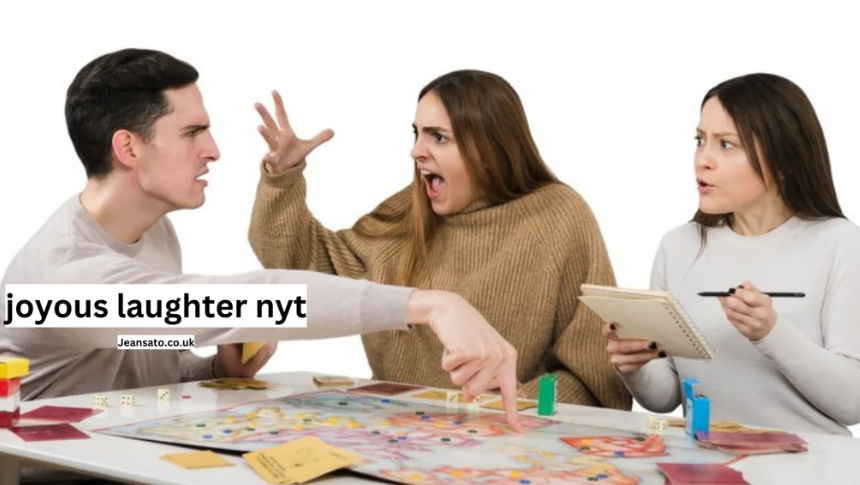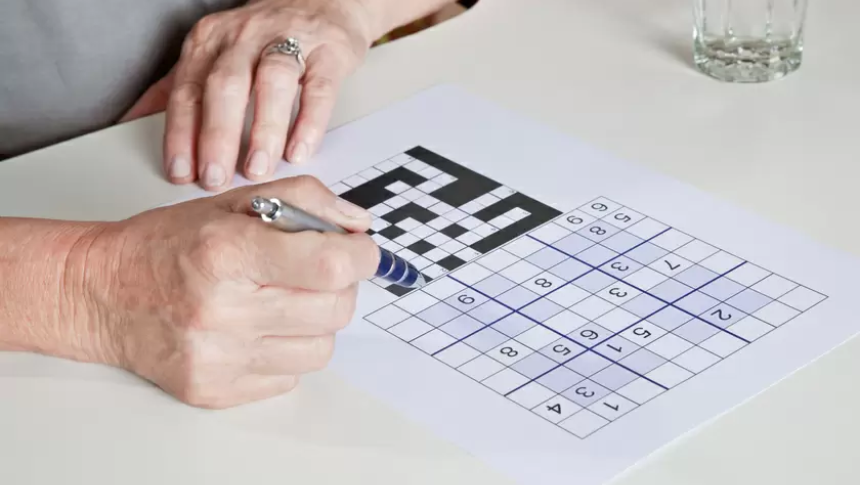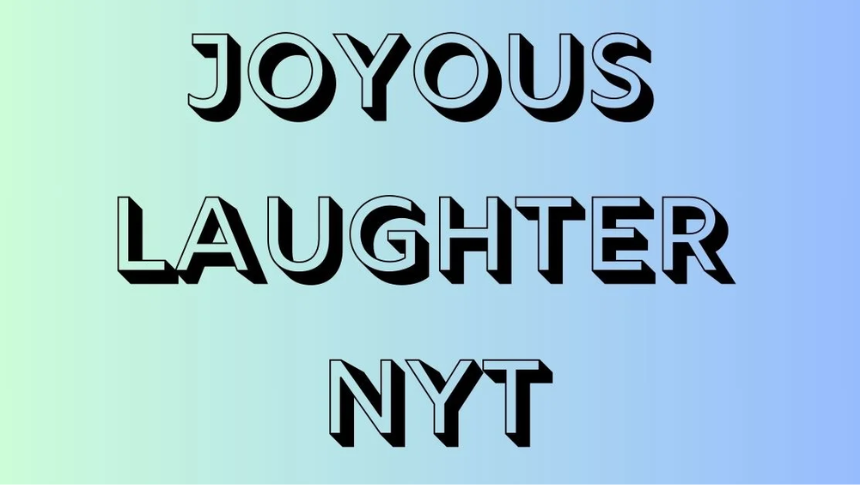Introduction
Crossword puzzles are cherished by many for their blend of challenge and entertainment, providing both a mental workout and a source of enjoyment. Among the most esteemed puzzles is the New York Times Crossword, celebrated for its clever clues and intricate wordplay. A particular clue that frequently stumps solvers is “Joyous Laughter NYT.” This article seeks to demystify this clue, offering insights into solving it and exploring strategies for tackling similar crossword puzzles. Whether you’re a seasoned solver or new to the game, understanding how to approach such clues can enhance your puzzle-solving skills and deepen your appreciation for the art of crossword construction.
Decoding “Joyous Laughter” In NYT Crosswords

The clue “Joyous Laughter” in the New York Times Crossword often presents a mix of simplicity and subtlety. To solve it, solvers need to consider various synonyms or phrases that capture the essence of joyous laughter. Here are some potential answers and the logic behind them:
- Guffaw: This term refers to a loud, hearty laugh. It effectively conveys the spontaneity and exuberance of joyous laughter, making it a fitting answer.
- Elation: Although not a direct synonym for laughter, elation describes a state of intense happiness, which is often accompanied by laughter. This word reflects the broader sense of joy that can lead to laughter.
- Mirth: This term specifically denotes amusement and is frequently associated with laughter. It captures the essence of joyful, light-hearted fun and fits well with the clue.
- Roar: In the context of laughter, “roar” suggests a loud and enthusiastic laugh. It conveys the powerful, uninhibited nature of joyous laughter, aligning with the clue’s intent.
By examining these options, solvers can better understand how to approach clues related to joyous laughter and apply similar reasoning to other crossword puzzles.
Tips For Solving Crossword Clues: Joyous Laughter NYT

Each crossword clue comes with a specified number of letters for the answer. This detail is crucial as it helps narrow down potential solutions and eliminates options that don’t fit the required length.
Think Synonymously
Crossword clues often require you to think of words with similar meanings. For a clue like “Joyous Laughter,” brainstorm all possible synonyms that convey the essence of joyful laughter, which can guide you to the correct answer.
Be Attentive To Wordplay
The New York Times Crossword is known for its clever wordplay. Pay attention to puns, double meanings, and subtle hints that might lead you to the answer. The clue might not always be straightforward and could involve creative twists.
Utilize Crossword Tools
When you’re stuck, consider using crossword dictionaries, thesauruses, or online crossword solvers. These tools can provide valuable hints and suggest possible answers, making it easier to find the solution.
By applying these strategies, you can enhance your crossword-solving skills and tackle clues related to joyous laughter with greater confidence.
Common Pitfalls: Joyous Laughter NYT
- Avoid Overthinking: It’s easy to get caught up in complex interpretations, but often the answer is simpler than it appears. Don’t let the clue’s complexity lead you to overcomplicate the solution.
- Ignoring Context: Pay attention to the surrounding clues and answers. They can offer critical hints or reveal patterns that help clarify the clue. If you’re stuck, solving nearby clues can provide useful context for finding the right answer.
- Fixation on One Idea: Stay open-minded and flexible. If your initial guess or a particular synonym doesn’t fit, be prepared to consider alternative words or meanings. Sometimes a different approach is all it takes to uncover the solution.
Social Benefits Of Solving Crossword Puzzles: Enhancing Connections Through Words

Social Connections And Laughter
Laughter is more than just a reaction; it’s a powerful social connector. When we laugh together, we build camaraderie and strengthen our relationships. Shared laughter breaks down barriers and fosters a sense of unity and belonging. In social settings, laughter is contagious, spreading joy and enhancing the dynamics within a group. It helps create a supportive atmosphere where connections can thrive and mutual understanding can flourish.
Laughter in the Workplace
Incorporating humor into the workplace can significantly enhance the overall environment. Joyous laughter helps reduce stress among employees, sparks creativity, and improves teamwork. Workplaces that embrace a light-hearted atmosphere often experience higher levels of employee satisfaction and lower turnover rates. Encouraging laughter not only makes the workday more enjoyable but also contributes to a more productive and cohesive team.
Therapeutic Uses Of Laughter
Laughter therapy, also known as humor therapy, uses the act of laughing to promote healing and improve quality of life. This therapeutic approach is utilized in various healthcare settings, including hospitals and mental health clinics. It helps patients manage pain, improve mood, and enhance overall well-being. Laughter therapy is particularly beneficial for individuals dealing with chronic illnesses, offering them relief and a boost to their mental health.
Cultural Perspectives on Laughter
Attitudes toward laughter vary significantly across cultures. In some societies, laughter is celebrated as a sign of happiness and vitality, while in others, it may be viewed as inappropriate in certain contexts. Recognizing these cultural differences allows us to appreciate the diverse ways in which laughter is experienced and expressed around the world. Understanding these nuances can deepen our appreciation for laughter’s role in different cultural settings.
Aging And Laughter
Laughter is vital for healthy aging. It helps older adults maintain social connections, which are crucial for mental and emotional health. Additionally, laughter can enhance memory and cognitive function, making it a valuable tool for sustaining mental sharpness in later years. Embracing laughter as part of daily life can contribute to a more fulfilling and vibrant aging process.
WaysTo Encourage More Laughter
There are numerous ways to integrate laughter into your life. Engaging with comedies, reading humorous literature, and spending time with funny friends are effective methods. Participating in laughter yoga classes or attending comedy shows can also provide regular opportunities to enjoy laughter. By actively seeking out these experiences, you can increase the frequency of laughter in your life and reap its many benefits.
Laughter In Education
In educational settings, laughter can be a powerful tool for creating a positive learning environment. It helps reduce student anxiety and makes lessons more engaging. Teachers who incorporate humor into their teaching often find that students are more motivated and retain information better. Laughter can transform the classroom into a space where learning is both enjoyable and effective.
Media And Entertainment’s Role
The media and entertainment industry plays a crucial role in delivering laughter to the masses. Comedy shows, stand-up performances, and humorous social media content offer a steady stream of amusement. These forms of entertainment not only provide enjoyment but also influence cultural norms around humor. They help shape our understanding of what is funny and contribute to the widespread appreciation of laughter.
Challenges In Laughter Research
Studying laughter presents unique challenges due to its subjective and context-dependent nature. Researchers must account for individual differences in humor perception and the various circumstances in which laughter occurs. Despite these difficulties, ongoing research continues to uncover new insights into the benefits and mechanisms of laughter. Understanding these aspects can help us better appreciate the role laughter plays in our lives.
Strengthening Relationships
Laughter plays a crucial role in strengthening relationships by fostering closeness and trust. Couples who laugh together are often more satisfied and better equipped to navigate conflicts. Sharing laughter with friends and family can deepen bonds and create lasting, positive memories. It enhances our connections with others and contributes to healthier, more fulfilling relationships.
Mental Health Benefits Of Solving Crossword Puzzles: Boosting Brainpower And Well-being
Engaging in activities that stimulate the brain can have profound benefits for mental health. Crossword puzzles, in particular, offer a unique combination of challenge and entertainment that can significantly enhance cognitive function and emotional well-being. The various mental health benefits of solving crossword puzzles and how they contribute to overall mental fitness.
Cognitive Enhancement
- Memory Improvement: Regularly solving crossword puzzles can help improve memory by challenging the brain to recall information. This exercise strengthens neural connections and enhances both short-term and long-term memory.
- Attention and Concentration: Crossword puzzles require focused attention to detail and sustained concentration. This mental exercise can improve overall attention span and the ability to concentrate on tasks.
- Problem-Solving Skills: Crosswords involve deciphering clues and finding the correct answers, which enhances critical thinking and problem-solving skills. This type of cognitive engagement can translate to improved decision-making abilities in daily life.
Emotional And Psychological Benefits
- Stress Relief: Engaging in a focused activity like solving a crossword puzzle can provide a mental break from stressors. This distraction helps reduce anxiety and promotes a sense of calm and relaxation.
- Sense of Accomplishment: Finishing a challenging puzzle provides a feeling of achievement and satisfaction. This boost in self-esteem and confidence can positively impact overall mood and emotional well-being.
- Mindfulness and Meditation: Solving puzzles can be a form of mindfulness, as it requires being present and fully engaged in the activity. This meditative aspect can help reduce rumination and promote a state of mental clarity.
Social Interaction And Support
- Community and Connection: Participating in puzzle-solving activities with others can foster social connections and provide a sense of community. This social interaction can alleviate feelings of loneliness and isolation, contributing to better mental health.
- Shared Joy and Collaboration: Working on puzzles with friends or family can enhance relationships through shared experiences and collaborative problem-solving. These positive interactions are beneficial for emotional support and well-being.
Protection Against Cognitive Decline
- Brain Flexibility and Plasticity: Regular mental exercise, such as solving crossword puzzles, helps maintain brain flexibility and plasticity. This can slow down age-related cognitive decline and keep the mind sharp.
- Preventing Dementia: Engaging in mentally stimulating activities has been linked to a lower risk of developing dementia and other cognitive disorders. Crossword puzzles provide a fun and effective way to keep the brain active and healthy.
Enhancing Creativity And Imagination
- Expanding Vocabulary: Crosswords often introduce solvers to new words and phrases, enhancing vocabulary and language skills. This expanded vocabulary can improve communication and creative expression.
- Encouraging Lateral Thinking: Puzzles encourage thinking outside the box and considering multiple perspectives to find solutions. This lateral thinking boosts creativity and innovation in problem-solving.
Engaging in brain-stimulating activities like crossword puzzles can have profound benefits for mental health. These puzzles offer a unique blend of challenge and entertainment, making them an effective tool for enhancing cognitive function and emotional well-being. Here’s how solving crossword puzzles contributes to overall mental fitness.
Cognitive Enhancement
- Memory Improvement: Regular crossword puzzle-solving strengthens neural connections and boosts both short-term and long-term memory. By challenging the brain to recall and process information, these puzzles act as an excellent exercise for enhancing memory.
- Attention and Concentration: The detailed focus required to solve crossword puzzles can improve overall attention span and concentration. This mental workout helps increase the ability to stay focused on tasks and reduces distractibility.
- Problem-Solving Skills: Deciphering clues and finding the right answers hones critical thinking and problem-solving abilities. This cognitive exercise translates to better decision-making skills in everyday life, enhancing overall problem-solving capabilities.
Emotional And Psychological Benefits
- Stress Relief: Crossword puzzles provide a mental distraction from daily stressors, helping to reduce anxiety and promote relaxation. This focused activity can offer a calming break and contribute to emotional stability.
- Sense of Accomplishment: Completing a challenging puzzle yields a strong sense of achievement and satisfaction. This boost in self-esteem and confidence positively impacts mood and enhances emotional well-being.
- Mindfulness and Meditation: Engaging in crossword puzzles requires full attention and presence, offering a form of mindfulness. This aspect of the activity helps to reduce rumination and fosters a state of mental clarity and focus.
Protection Against Cognitive Decline
- Brain Flexibility and Plasticity: Regular mental exercises like crossword puzzles maintain brain flexibility and plasticity, helping to slow age-related cognitive decline. Keeping the mind active through puzzles ensures better mental sharpness over time.
- Preventing Dementia: Engaging in mentally stimulating activities is associated with a lower risk of developing dementia and other cognitive disorders. Crossword puzzles offer a fun and effective way to keep the brain engaged and healthy.
Enhancing Creativity And Imagination
- Expanding Vocabulary: Crosswords expose solvers to new words and phrases, enhancing vocabulary and language skills. This expanded vocabulary improves communication and supports creative expression.
- Encouraging Lateral Thinking: Puzzles foster lateral thinking by encouraging solvers to think outside the box and explore multiple perspectives. This type of creative thinking boosts innovation and problem-solving skills.
In summary, crossword puzzles are more than just a pastime—they are a powerful tool for improving cognitive function, emotional health, and social connections. By incorporating these puzzles into your routine, you can enjoy a range of mental and emotional benefits while keeping your mind sharp and engaged.
FAQs
Q. What is the significance of crossword puzzles for mental health?
Crossword puzzles offer cognitive and emotional benefits, including improved memory, attention, and problem-solving skills. They provide stress relief, a sense of accomplishment, and can promote mindfulness.
Q. How can solving crossword puzzles enhance cognitive function?
Solving crossword puzzles enhances cognitive function by challenging the brain to recall information, improve concentration, and develop problem-solving skills. These activities help maintain brain flexibility and plasticity
.Q. Are there specific strategies for solving challenging crossword clues? Yes, strategies include considering the length of the answer, thinking of synonyms, paying attention to wordplay, and using crossword tools. Avoid overthinking, consider the context of surrounding clues, and remain flexible in your approach.
Q. How does laughter relate to mental and emotional well-being?
Laughter fosters social connections, reduces stress, enhances mood, and contributes to overall emotional health. It can also improve relationships and provide therapeutic benefits.
Q. What role does laughter play in various cultural contexts?
Attitudes toward laughter vary by culture. In some cultures, laughter is seen as a sign of joy and vitality, while in others, it may be considered inappropriate in certain situations. Understanding these perspectives can enrich our appreciation of laughter.
Q. How can one incorporate more laughter into daily life?
To increase laughter, engage in activities like watching comedies, reading humorous books, or spending time with funny friends. Laughter yoga classes and comedy shows are also effective ways to bring more laughter into your life.
Conclusion
Crossword puzzles and laughter both play significant roles in enhancing mental health and well-being. Crossword puzzles offer a stimulating blend of challenge and entertainment that boosts cognitive function, supports emotional stability, and fosters social connections. They provide a structured way to exercise the brain, improve memory, and develop problem-solving skills.
Laughter, on the other hand, serves as a powerful social connector and stress reliever. It strengthens relationships, supports mental health, and can be therapeutic in various settings. By integrating crossword puzzles into your routine and seeking out opportunities for laughter, you can significantly enhance your cognitive fitness and emotional well-being.
Both activities offer valuable benefits, from sharpening the mind to enriching social interactions. Embracing these practices can lead to a more balanced, fulfilling, and joyful life.
Keep in touch for updates and visit us again for the latest news: Ny City Paper!
